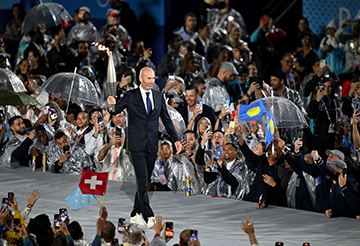Olympics
U.S. athletes praise Paris Games prize money plan

World Athletics’ (WA) plan to offer prize money to Olympic gold medallists is a much needed step in the right direction, said American track and field athletes, with the high costs of training and competition weighing on competitors.
WA President Sebastian Coe bucked 128 years of tradition when he said last week that the athletics governing body would pay gold medal winners in Paris $50,000, a move that athletes were quick to endorse.
“You can lose money in track and field as soon as you step out the door,” Tara Davis-Woodhall, the indoor world champion in long jump, told reporters this week at the Team USA Media Summit in New York.
Davis-Woodhall said even travelling to competitions presents a major financial burden for many athletes.
“If I don’t have a sponsorship, who’s going to pay for this? I’m going to go in debt like 100%,” said Davis-Woodhall, who won a silver medal at the 2023 world championships in Budapest. “It’s not a sustainable thing to do at all.”
Under the WA plan, a $2.4 million prize pot will be split between the 48 athletics gold medallists at the Paris Games, which start on July 26.
Silver and bronze medal winners will also receive prize funds beginning at the Los Angeles Games in 2028.
“It’s about time,” said Olympic 200 metres silver medallist Kenny Bednarek. “You have athletes that work their butt off, blood, sweat and tears every single day, every single year. And, you know, some compensation is needed for them.”
Their remarks echoed the endorsement of United States Olympic and Paralympic Committee (USOPC) CEO Sarah Hirshland, who applauded the plan.
“Any time we can put resources in the hands of athletes, we should all celebrate,” Hirshland told reporters in New York on Monday.
“We need more resources to get into the hands of athletes, so that they have both the ability to sustain themselves from a just day-to-day lifestyle perspective, but then also (to) continue to invest in their training.”
But the prize money plan has attracted plenty of criticism from other corners of international sport.
British Olympic Association chief Andy Anson told Sky Sports on Wednesday that World Athletics created a problem by moving unilaterally on the issue.
The head of cycling’s global governing body said on Tuesday that WA had gone against the Olympic spirit, while World Rowing head Jean-Christophe Rolland said he wished WA had discussion with other sports, saying the decision has “other implications.”
Twice Olympic shot put champion Ryan Crouser said he struggles to see how anyone could oppose the prize money.
“I know athletes that have medalled at world championships are still working two jobs and living with a room mate,” the world record holder said.
“It’s just the misconception that kind of lingers that athletes, regardless of what level you’re at, if you’re making the Olympics, that you’re that you’re financially secure and you are absolutely not.”
-Reuters
Olympics
Nigerians among athletes that sail through Seine River for Paris Olympics opening ceremony


Athletes representing 184 countries sailed through the Seine River in Paris for the glamour-filled Opening Ceremony of the Paris 2024.

Team Nigeria’s Captain, Anuoluwapo Opeyori and Flag bearer, Oluwalobiloba Amusan
Even as the Games formally begin, the Nigerian contingent led by Anuoluwapo (The mercy of the Lord is much) Opeyori was part of the history making event.
It was the first time that the athletes did not have to march on the tracks. Rather, they sailed over ta river.
Olympics
Great man! Zidane opens the 2024 Olympics Opening Ceremony


On Friday, football legend, Zinedine Zidane had his profile further raised as he was the first of the galaxy of stars to step out at the never-to-be-forgotten Opening Ceremony of the Paris 2024.
The French football and Real Madrid legend Zinedine Zidane launched the opening ceremony of the Paris 2024 Olympic Games with movie star Jamel Debbouze. Some beautiful images for these historic Olympics in France.
Olympics
France and Olympic Games are a great love story


It is well known that the founder of the Olympic Games is a French man, Pierre de Coubertin who was a champion of sport in education. In 1894 he proposed a revival of the Olympic Games. Now his country is hosting the Games.
The address of the President of the Organising Committee of the Olympic Games, Tony Estanguet, made a passing connection to the France and the Games.
In his speech, he thanked the “lovers of the Games”. Despite the rain, he reminded everyone that ‘France and the Olympic Games are a great love story.
In his speech, Thomas Bach, President of the International Olympic Committee, hailed Paris as the first Olympic Games to fully respect ‘gender parity in competition’.
French President Emmanuel Macron then declared the Paris Olympic Games open, with the Eiffel Tower in the background, uttering the protocol formula that officially marks the opening of the Olympic fortnight.
“I declare the Paris Games open, the 33rd Olympic Games of the modern era,” he declared during the opening ceremony, after speeches by Tony Estanguet, patron of the Paris 2024 organisation, and Bach.
-

 Olympics16 hours ago
Olympics16 hours agoThis is my story: Odegbami on how he is stranded in London
-

 Nigerian Football1 week ago
Nigerian Football1 week agoI prefer a foreign coach for the Super Eagles, says Amaju
-

 Olympics5 days ago
Olympics5 days agoBrazilian women train in Zidane’s birthplace ahead of Nigeria Super Falcons clash
-

 Premier League1 week ago
Premier League1 week agoNigerian-born Man United’s new striker promises creativity and unpredictability to fans
-

 Nigerian Football1 week ago
Nigerian Football1 week agoOsimhen’s outburst was a moment of madness, says Amaju
-

 OBITUARY2 days ago
OBITUARY2 days agoBREAKING! Former Heartland FC owner, Iwuanyanwu, dies at 81
-

 Olympics7 days ago
Olympics7 days agoTeams plan for lack of toilets on Paris opening ceremony barges
-

 Olympics1 week ago
Olympics1 week agoWhat you need to know about the Paris 2024 Olympics opening ceremony



